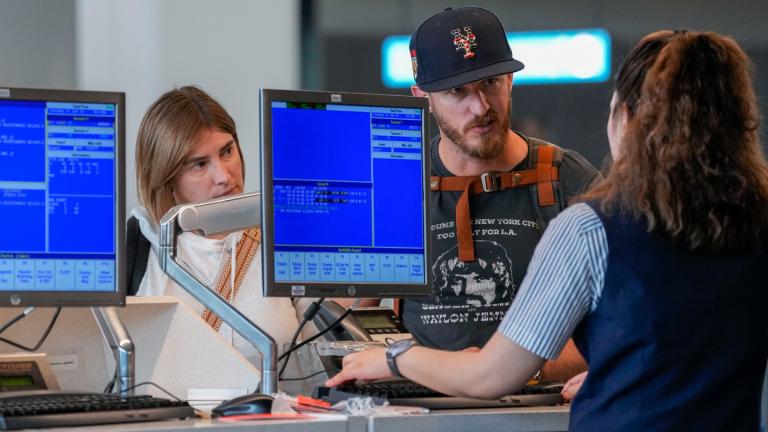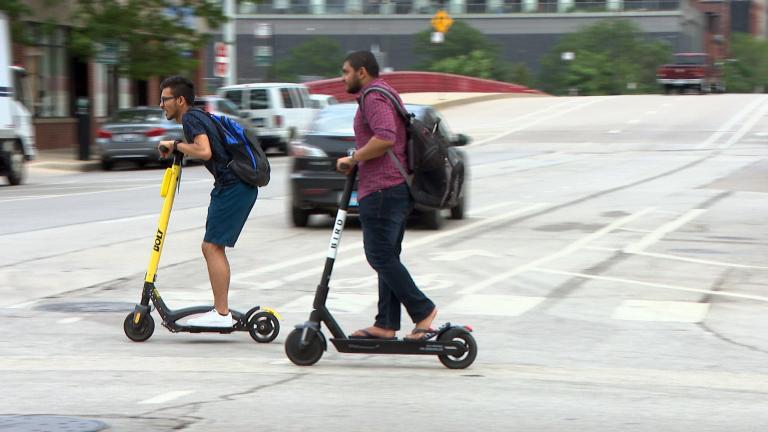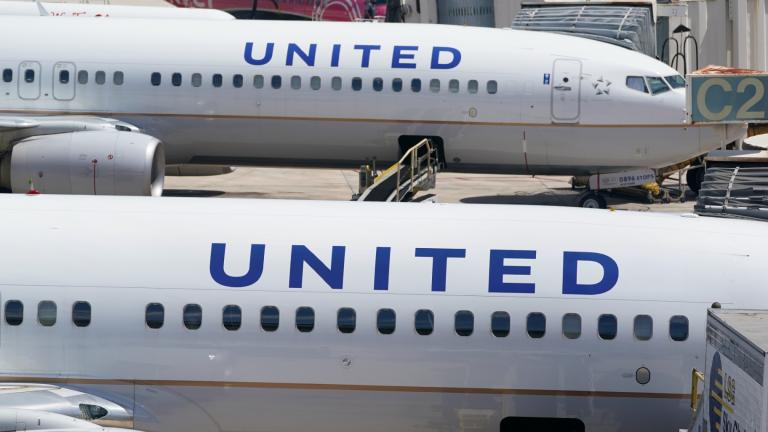Shared electronic scooters got the green light to return to Chicago streets this spring — including downtown and the 606 Trail, where they were banned in last year's pilot program.
The Chicago City Council voted Thursday to approve the scooter sharing project which will operate in a similar manner to the Divvy bicycle-sharing system. City officials are hopeful that the two-wheeled vehicles will reduce congestion and encourage the use of public transportation throughout Chicago.
The ordinance would allow the three firms that win two-year licenses from the city to deploy a maximum of 6,000 scooters on Chicago’s streets once the looming winter eases, officials said. Each firm would be allowed no more than 2,000 scooters at first, and the program could expand to a total of 12,500 scooters.
Transportation Committee Chair Ald. Howard Brookins (21st Ward) said city officials “must walk the walk and talk the talk” on efforts to improve Chicago’s environment.
Ald. Raymond Lopez (15th Ward) and Ald. David Moore (17th Ward) said they voted no because scooters, discarded haphazardly by riders, proved to be a nuisance in their wards.
Other alderpeople, including Ald. Harry Osterman (48th Ward) and Ald. Brian Hopkins (2nd Ward) voted against the measure because they don’t want the scooters in their wards at all.
The city stands to earn $4.4 million from the permit fees for the 6,000 scooters in the program’s first phase. Riders who rent the two-wheeled scooters would also pay the city 9% lease tax, O’Malley said.
To prevent the two-wheeled vehicles from becoming nuisances for pedestrians, each scooter must be equipped with a system that sounds an alarm when it is ridden on Chicago’s sidewalks, according to the proposal. The alert would be similar to the one made by cars when a drivers’ seat belt is not engaged, to alert both the rider and nearby pedestrians that the scooter is being operated in the wrong place, officials said.
The scooters must be locked to poles or bicycle racks at the end of a ride, according to the new rules. Companies would be allowed to build corrals for the scooters, but not required to.
The only place the e-scooters could not be ridden in Chicago would be the Lakefront Trail. Companies would be required to make sure an ample number of scooters are available on the South and West sides, according to the rules.
Both pilot programs in 2019 and 2020 banned e-scooters from the Central Business District as well as the Lakefront Trail and the 606 Trail.
In other action, the City Council unanimously granted landmark status to the North Kenwood two-flat where blues giant Muddy Waters lived for two decades.
Chandra Cooper, the great-granddaughter of the musical legend who was born McKinley Morganfield, has spearheaded the effort to have the home designated as a landmark to preserve the legacy of African Americans in Chicago and ensure that future generations recognize her great-grandfather as the father of the blues.
The brick structure at 4339 S. Lake Park Ave. is set to become a museum.
Read more: Legacy of Muddy Waters to Live On at MOJO Museum
However, the City Council took no action on a measure that would have granted the Chicago Police Board the power to overrule the Chicago Police Department and remove a Chicagoan from an under-development gang database.
Several alderpeople blocked the vote after questioning why they were being asked to give the Police Board new powers when it is not clear how the new database will operate.
Also blocked from advancing were two measures from Ald. Anthony Beale (9th Ward), a frequent critic of the mayor. That move set off a series of procedural maneuvers that highlighted how divided the Chicago City Council is at the moment.
One, stalled since March, would have stopped ticketing motorists traveling between 6 and 9 mph more than the speed limit near Chicago parks and schools monitored by cameras, while the other, which has languished in legislative purgatory, would have allowed the City Council to hire its own attorney.
Both measures were poised to be sent to committees where they could have gotten substantive hearings and votes, but Ald. Brendan Reilly (42nd Ward) and Ald. Ariel Reboyras (30th Ward) blocked that normally procedural vote.
That angered Beale, who promptly began blocking every measure introduced by his colleagues on the City Council by sending them to legislative limbo. Reilly responded by working with Lightfoot to suspend the City Council’s normal rules of procedures to send the items temporarily blocked by Beale to their intended committee for consideration.
Contact Heather Cherone: @HeatherCherone | (773) 569-1863 | [email protected]








